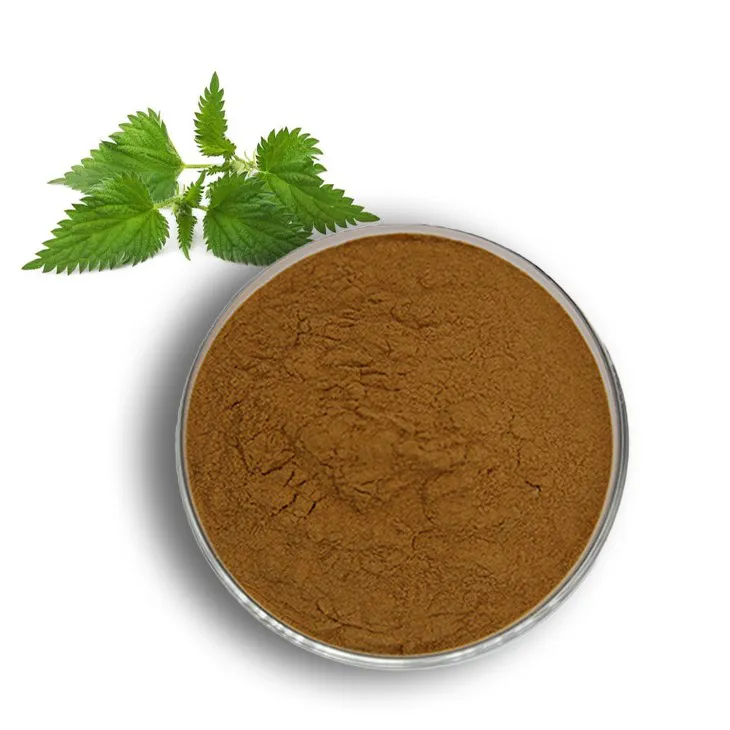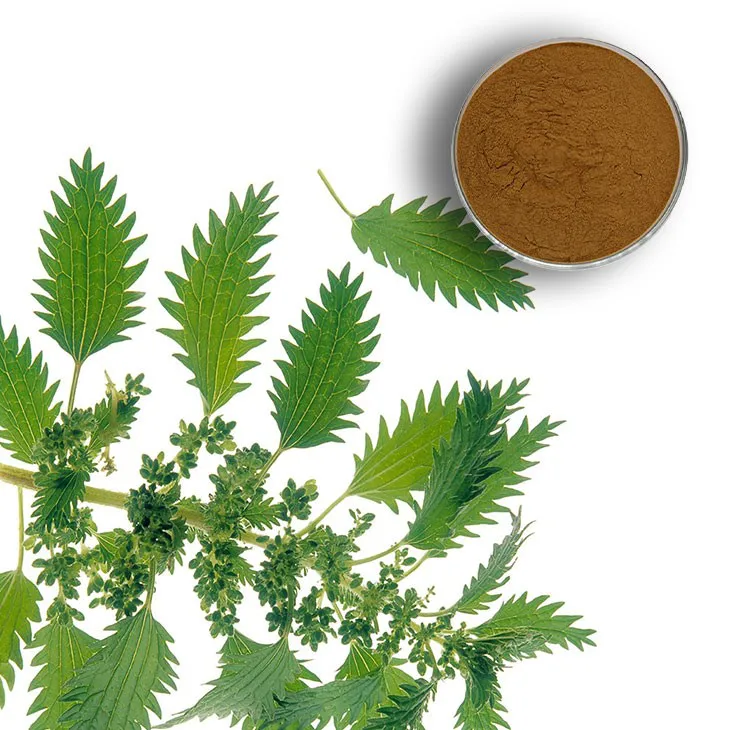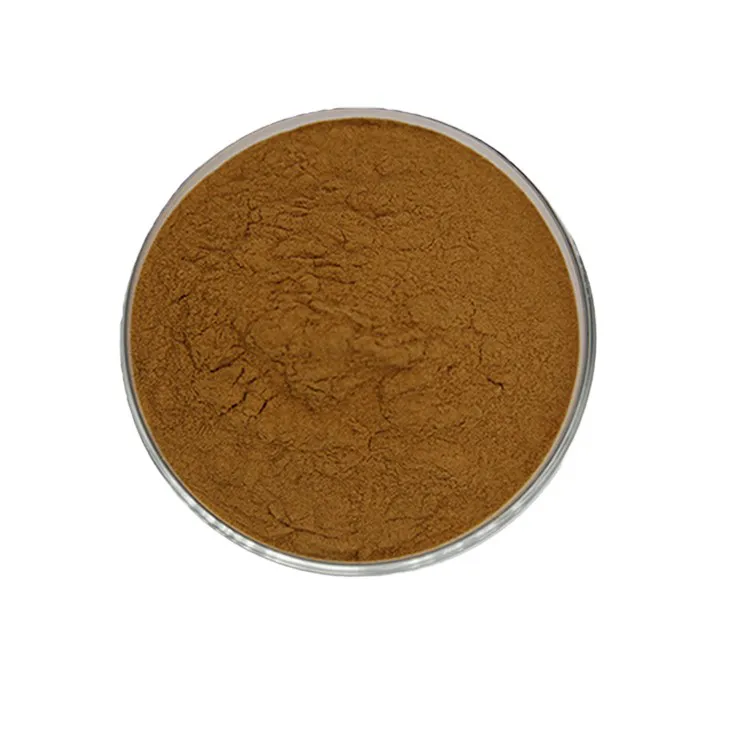- 0086-571-85302990
- sales@greenskybio.com
Nettle root extract: Is the extract effective for weight loss?
2024-11-12

Introduction
In the quest for effective weight loss solutions, many natural substances have come under the spotlight, and Nettle Root Extract is one of them. Nettle, scientifically known as Urtica dioica, has a long history of traditional use in various medicinal applications. But when it comes to its potential role in weight loss, there are several aspects that need to be explored.

Metabolism and Nettle Root Extract
1. Basal Metabolic Rate (BMR)
- One of the key factors in weight loss is the basal metabolic rate, which is the amount of energy the body expends at rest. Some studies suggest that Nettle Root Extract may have an impact on BMR. It could potentially increase the body's energy expenditure by influencing the thyroid gland. The thyroid hormones play a crucial role in regulating metabolism. Nettle root contains certain compounds that might interact with the thyroid, promoting a more efficient metabolic function. However, more research is needed to fully understand this relationship. For example, in a small - scale study, researchers observed a slight increase in the metabolic rate of participants who were given nettle root extract supplements over a period of several weeks. But the results were not conclusive enough to establish a definite causal link.
- Another aspect to consider is that nettle root extract may affect the mitochondria, the powerhouses of the cells. Mitochondria are responsible for producing energy in the form of ATP. If nettle root extract can enhance mitochondrial function, it could lead to increased energy production and potentially a higher BMR. Some preliminary research on plant extracts similar to nettle root has shown promising results in this regard, but again, more targeted studies on nettle root extract specifically are required.
- Thermogenesis is the process by which the body generates heat, and it can contribute to calorie burning. Nettle root extract may play a role in thermogenesis. It could potentially stimulate brown adipose tissue (BAT). BAT is a type of fat tissue that burns calories to produce heat, unlike white adipose tissue which stores energy. Some animal studies have indicated that certain components in nettle root extract might activate BAT, leading to increased thermogenesis. However, translating these findings from animals to humans is not straightforward, and human - based research in this area is still in its early stages.
- Moreover, nettle root extract might also influence the sympathetic nervous system, which is involved in regulating thermogenesis. By activating the sympathetic nervous system, it could increase the body's heat production. But the mechanisms underlying this potential effect are complex and not fully understood yet. For instance, it could be related to the release of certain neurotransmitters or hormones that are affected by the extract.

Appetite Regulation and Nettle Root Extract
1. Hormonal Influence on Appetite
- Appetite is regulated by a complex interplay of hormones. One such hormone is leptin, which is produced by fat cells and signals the brain when the body has enough energy stores. Some evidence suggests that nettle root extract may affect leptin levels. In a few experimental studies, it was observed that nettle root extract supplementation seemed to improve leptin sensitivity. This means that the body may be better able to respond to the signals from leptin, potentially reducing appetite. However, the exact mechanisms by which nettle root extract influences leptin are not clear. It could be due to its antioxidant properties, as oxidative stress has been linked to leptin resistance.
- Another important hormone in appetite regulation is ghrelin, often referred to as the "hunger hormone." Ghrelin is produced mainly in the stomach and stimulates appetite. Nettle root extract may interact with ghrelin production or its signaling pathway. There is some speculation that it could reduce ghrelin levels, thereby decreasing the feeling of hunger. But so far, research on this aspect is limited, and more in - depth studies are needed to confirm these potential effects.
- Aside from hormonal effects, nettle root extract may also contribute to satiety, the feeling of fullness. It could potentially do this through its fiber content. Nettle root contains dietary fiber, which can slow down the digestion process. When food is digested more slowly, it stays in the stomach longer, sending signals of fullness to the brain. For example, soluble fiber in nettle root extract can form a gel - like substance in the digestive tract, which can make one feel satisfied with less food intake. However, the amount of fiber in nettle root extract compared to other high - fiber foods and its overall impact on satiety in a real - world diet context need further investigation.
- Some components in nettle root extract may also affect the gut - brain axis. The gut - brain axis is a bidirectional communication system between the gut and the brain that influences various physiological processes, including appetite. It is possible that nettle root extract modifies the signals sent along this axis, enhancing the feeling of satiety. But current knowledge about how exactly it might do this is scarce, and more research is essential.

Fat - Burning Processes and Nettle Root Extract
1. Lipolysis
- Lipolysis is the breakdown of fats into glycerol and free fatty acids, which can then be used for energy. Nettle root extract may have an impact on lipolysis. Some of its bioactive compounds, such as flavonoids and phenolic acids, have been shown in laboratory studies to stimulate lipolytic enzymes. These enzymes are responsible for initiating the breakdown of fats. For example, in vitro experiments have demonstrated that certain extracts from nettle root can increase the activity of lipase, an enzyme involved in lipolysis. However, in vivo studies in humans are needed to determine if these effects are significant enough to contribute to actual fat loss.
- Furthermore, nettle root extract might affect the lipid metabolism pathways in the body. It could potentially regulate the transport and utilization of fatty acids. By influencing these pathways, it may help the body to more effectively burn fat. But the exact mechanisms by which it does this are not well - known, and more research is required to elucidate them.
- Nettle root extract may also play a role in inhibiting fat storage. One way it could do this is by interfering with the adipogenesis process, which is the formation of new fat cells. Some studies have suggested that certain components in nettle root extract can block the differentiation of pre - adipocytes (cells that can become fat cells) into mature adipocytes. This means that there would be fewer fat cells available to store excess fat. However, the long - term effects of such inhibition on overall body fat distribution and health are still uncertain.
- Another possible mechanism is that nettle root extract may affect the expression of genes related to fat storage. It could potentially down - regulate genes that promote fat accumulation and up - regulate genes that are involved in fat metabolism. But this area of research is still in its infancy, and more comprehensive studies are needed to understand the full implications.

Real - Life Experiences and Nettle Root Extract for Weight Loss
1. Anecdotal Evidence
- There are numerous anecdotal reports from individuals who claim that nettle root extract has helped them with weight loss. Some people report a decrease in appetite after taking nettle root extract supplements. For example, a user on an online weight loss forum shared that they noticed a reduction in their cravings for sugary and high - calorie foods after starting to take nettle root extract daily. However, anecdotal evidence is not scientific proof, as there could be other factors at play, such as changes in diet or exercise habits simultaneously.
- Others have reported an increase in energy levels, which they believe has contributed to their ability to be more active and burn more calories. One individual said that they felt less sluggish and were able to exercise more regularly after incorporating nettle root extract into their routine. But again, this could be due to a placebo effect or other lifestyle changes.
- While there have been some clinical trials on nettle root extract in relation to various health aspects, the number of well - designed, large - scale clinical trials specifically focused on weight loss is relatively small. In the existing clinical trials, there are often limitations such as short study durations, small sample sizes, and inconsistent methodologies. For instance, a trial that aimed to study the effect of nettle root extract on weight loss in overweight individuals had a sample size of only 50 participants and lasted for just 8 weeks. This may not be sufficient to accurately measure the long - term effectiveness of the extract for weight loss.
- Moreover, the composition of nettle root extract used in different trials can vary. Some extracts may be more concentrated or pure than others, which can affect the results. Additionally, in some trials, the participants may not have been on a strictly controlled diet or exercise regime, making it difficult to isolate the effect of the nettle root extract on weight loss.
Conclusion
In conclusion, while there are some promising indications that nettle root extract may be effective for weight loss, the current evidence is not conclusive. There are potential mechanisms through which it could influence metabolism, appetite regulation, and fat - burning processes. However, more in - depth and large - scale scientific research is needed. Real - life experiences, although interesting, cannot replace scientific evidence. Until more comprehensive studies are carried out, it is difficult to definitively state whether nettle root extract can truly aid in losing weight.
FAQ:
What is nettle root extract?
Nettle root extract is derived from the roots of the nettle plant. It contains various bioactive compounds that may have potential effects on the body's physiological processes.
How might nettle root extract affect metabolism?
Some studies suggest that nettle root extract may influence metabolism by interacting with certain hormones or enzymes. For example, it could potentially enhance the function of the thyroid gland, which plays a key role in regulating metabolism. However, more research is needed to fully understand this mechanism.
Can nettle root extract regulate appetite?
There is some evidence to suggest that nettle root extract may have an impact on appetite regulation. It might work by affecting the levels of hormones that signal hunger or fullness in the body, such as ghrelin and leptin. But again, this is an area that requires further investigation.
Does nettle root extract directly burn fat?
While there are claims that nettle root extract can aid in fat - burning, the scientific evidence is not conclusive. Some research indicates that it may have a role in lipid metabolism, but it's not clear if this translates into direct fat - burning. It could potentially affect the way the body stores or uses fat, but more studies are necessary to confirm.
Are there any side effects of using nettle root extract for weight loss?
Some people may experience side effects when using nettle root extract, such as mild digestive issues or allergic reactions. It's important to note that individual responses can vary. Before using it for weight loss, it's advisable to consult a healthcare professional.
Related literature
- The Effects of Nettle Root Extract on Body Composition: A Review"
- "Nettle Root Extract and Metabolism: Current Research Findings"
- "Investigating the Role of Nettle Root Extract in Appetite Regulation"
- ▶ Hesperidin
- ▶ Citrus Bioflavonoids
- ▶ Plant Extract
- ▶ lycopene
- ▶ Diosmin
- ▶ Grape seed extract
- ▶ Sea buckthorn Juice Powder
- ▶ Fruit Juice Powder
- ▶ Hops Extract
- ▶ Artichoke Extract
- ▶ Mushroom extract
- ▶ Astaxanthin
- ▶ Green Tea Extract
- ▶ Curcumin
- ▶ Horse Chestnut Extract
- ▶ Other Product
- ▶ Boswellia Serrata Extract
- ▶ Resveratrol
- ▶ Marigold Extract
- ▶ Grape Leaf Extract
- ▶ New Product
- ▶ Aminolevulinic acid
- ▶ Cranberry Extract
- ▶ Red Yeast Rice
- ▶ Red Wine Extract
-
Peppermint Extract Powder
2024-11-12
-
Passionflower Extract
2024-11-12
-
Tamarind extract powder
2024-11-12
-
Europen Bilberry Extract
2024-11-12
-
Sugarcane Extract
2024-11-12
-
Ivy Extract
2024-11-12
-
Polygonum multiflorum extract
2024-11-12
-
Oat Straw Extract Powder
2024-11-12
-
Yohimbine Bark Extract
2024-11-12
-
Fenugreek Extract Powder
2024-11-12





















